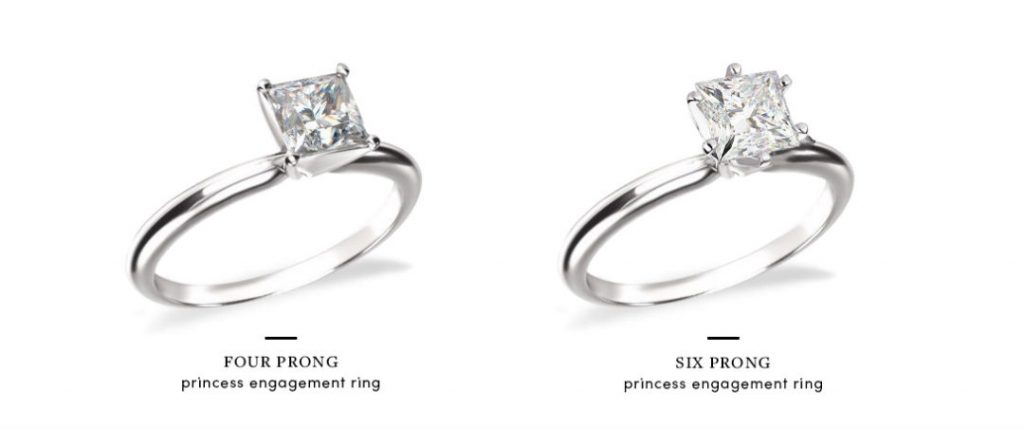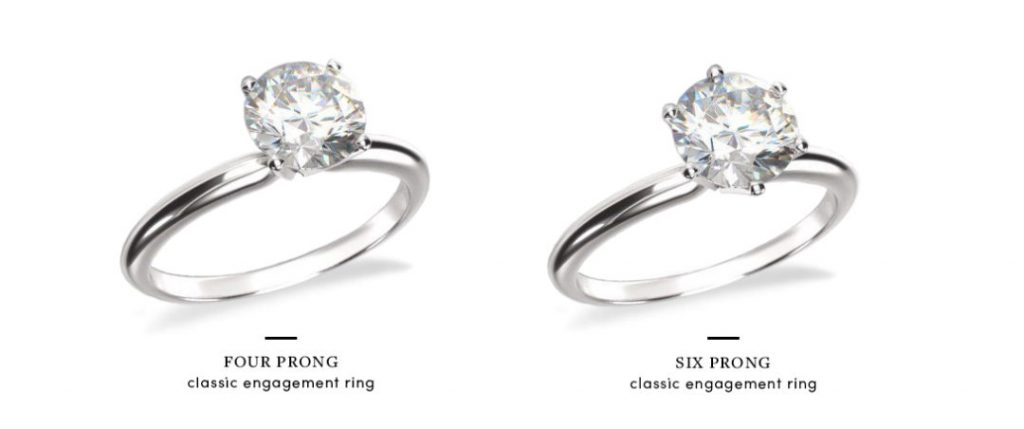Is a 4 Prong Or 6 Prong Solitaire Engagement Ring Right for You?

Solitaire diamond engagement rings are beautiful but simple. There isn't much to consider when picking one out (besides the carat size) — or is there? Actually, there is a huge decision you have to make when evaluating a solitaire ring: 4 prongs or 6 prongs.
Which is the right choice for you? Let's break it down.
TABLE OF CONTENTS
What are Prongs?
In simple terms, a prong is a small metal claw that holds the center loose diamond in place on the ring. Prongs vary — from rounded or flat to V-shaped — but their sole purpose is to keep the most important piece of your ring in place.
When it comes to 4 prong vs. 6 prong, one isn't necessarily better than the other.
4 Prong vs 6 Prong Rings: The Pros and Cons
While the prong you pick doesn't make or break your diamond engagement ring, it can influence how it looks to the eye. Case in point: A 4 prong ring makes your diamond the center of attention and allows for less metal on your ring. You might like this, especially if you're going with white gold or platinum metal because it helps the prongs blend in more with the diamond.
Opting for a 4 prong ring can also make your diamond look more square. This feature makes it a good option for square or rectangular diamond shapes like princess and emerald cut.

The downside is that opting for 4 prongs can make it less secure. While both 4 and 6 prongs are considered safe for diamonds, a 4 prong is more likely to give if something happens to one of them, meaning your stone can easily fall out. It also doesn't protect the diamond's girdle — the part of the diamond that separates the crown (top) from the pavilion (bottom) — as well as a 6 prong.
That said, 6 prong rings might overshadow smaller stones and make the ring harder to clean since dirt tends to gather underneath the prongs. That said, a 6 prong is an especially good choice if you have a brilliant-cut diamond because it makes your stone look even rounder.

4 Prong vs 6 Prong: Clearing Up Some Issues
You've probably received a lot of advice from others while shopping for an engagement ring. While most people have good intentions — and are only sharing what they know to be true — there are some myths that are out there regarding the 4 prongs vs. 6 prongs debate.
One of the biggest myths? That prongs block out light, so 4 prongs make your diamond sparkle more. This just isn't true, according to the Gemological Institute of America. While all prongs can block light, they're so small that it's not something worth worrying about. Instead, you should focus more on the cut of your diamond if you're worried about it shining (spoiler alert: Round brilliant cuts offer the most shine, while step cuts offer the least amount).
Which is More Expensive, 4 Prong or 6 Prong Rings?
Here's the great news: The number of prongs you pick doesn't affect the price at With Clarity (though we can't say the same for other jewelers).
Need proof? Compare the Classic Six Prong Solitaire Diamond Engagement Ring and the Classic Four Prong Solitaire Diamond Engagement Ring. Both start at the exact same price.
That said, not all diamond engagement ring settings offer both 4 prong and 6 prong options. Your best bet: Get in touch with one of the expert gemologists at With Clarity. Our experts can help you find prong options that help you get the most out of your diamond engagement ring — and your budget.









